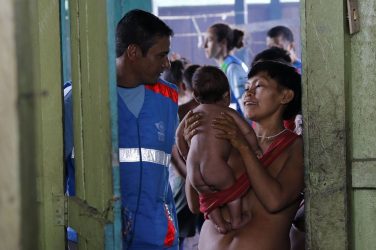Prominent Brazilian human rights activist and councilwoman Marielle Franco was assassinated in Rio de Janeiro.
Part of a generation of young Black Brazilians who are becoming increasingly vocal inside and outside statehouses, Franco was elected to office in 2016.
A resident of the Favela da Maré, an impoverished community in Rio, she was one of the main defenders of human rights in the country.
Franco was shot dead in a car on Joaquim Palhares Street, in the Central Region of Rio, at about 9:30 p.m. on Wednesday.
The driver of the vehicle, Anderson Pedro Gomes, was also fatally shot, and a passenger, Marielle’s adviser, was struck by shrapnel.
Investigators at the Homicide Office said that the main line of investigation is execution.
The day before she was murdered, Marielle complained about the violence in the city in a post on her personal Twitter. In the post, she questioned the action of the Military Police. “One more homicide of a young man who may be coming in for the PM’s account… How many more will have to die for this war to end?”
Also two weeks earlier Franco was named a rapporteur in the special commission established by the city council to monitor the military intervention in the city of Rio de Janeiro. Three days ago she denounced the deaths of two youths during a military police operation in Acari community.
“We must speak loudly so that everybody knows what is happening in Acari right now. The 41st Military Police Battalion of Rio de Janeiro is terrorizing and violating Acari residents. This week two youths were killed and tossed in a ditch. Today, the police walked the streets threatening residents. This has always happened and with the military intervention things have gotten worse,” she wrote on Twitter.
Franco was raised in Maré community complex, home to approximately 140,000 residents. Soldiers have occupied the community again, as they did for over a year between 2014 and 2015, as part of the Brazilian government’s military intervention in the state of Rio de Janeiro on February 16.
The move was in response to increased violence and drug gangs who have “virtually taken over,” according to Brazilian President Michel Temer. Approximately 3,200 soldiers now patrol public streets in predominantly poor, working class neighborhoods.
Former Brazilian President Dilma Rousseff characterized the intervention as being a means to create an enemy, which “in Brazil’s case, is poor Black people who live in periphery neighborhoods…It’s not white people who live in Ipanema nor in Leblon.”
Workers’ Party Congressman and former head of Rio de Janeiro’s Bar Association, Wadih Damous, wrote on his Twitter account that “Marielle was executed. The assassination was consummated today but it’s the result of a plot forged by the barbaric nature that has taken hold of Brazil.
“Under fascism, extermination groups act in complete freedom. Meanwhile, the military intervention (in Rio de Janeiro state) search backpacks of kids who live in favelas.”
Protests have been organized in the cities of Recife, Belém, Salvador, Natal, São Paulo, Brasília among others to condemn Franco’s killing.
teleSUR













